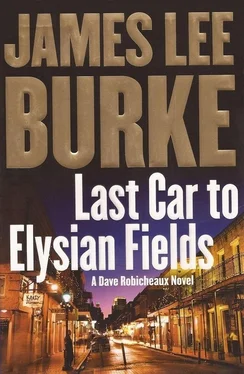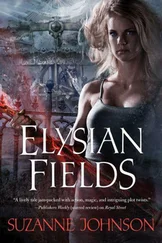In my absence Father Jimmie had cornered both Castille LeJeune and Merchie Flannigan and was talking heatedly with them, his coat separating on his chest when he raised his arms to make a point, one foot at a slight angle behind the other, in the classic position of a martial artist.
“Let me finish if you would,” he said when Merchie Flannigan tried to speak. “You say you’re cleaning up the Crudups’ property? The place is floating in sludge.”
“I’m sure Merchie is doing his best. Why don’t you help yourself to the food, Father?” Castille LeJeune said.
He was a trim, nice-looking man, with a lean face and steel gray hair that he combed straight back. He wore a white sports coat and dark blue shirt and a gold and onyx Mason’s ring on his marriage finger.
“No, thanks,” Father Jimmie said, wagging two fingers as though brushing Castille LeJeune’s words from the air. “So let me see if I understand correctly. In 1951 you took a friend to Angola Prison to record Junior Crudup, but you have no idea what happened to Junior later?”
“I was doing a favor for my wife. She was fond of folk music. That was a long time ago,” LeJeune answered, his eyes crinkling at the corners, his gaze wandering among his guests.
“But a retired guard, a man named Strunk, says you got Junior pulled off the levee gang.”
“I don’t remember that. I wouldn’t have had that kind of influence,” LeJeune said.
“Really?” Father Jimmie said. “You wouldn’t throw a fellow a slider, would you?”
The insult to a man of his age and position seemed not to register in LeJeune’s face. Instead, his eyes crinkled again. “Have a good time,” he said. He placed his hand warmly on Father Jimmie’s arm and walked away.
“Let me get you a beer, Father,” Merchie Flannigan said.
“Shame on you for what you’re doing to those black people in St. James Parish,” Father Jimmie said.
Father Jimmie’s heart might have been in the right place, but it was embarrassing to listen to him berate Merchie Flannigan in front of others and I didn’t wait to hear Merchie’s reply. I walked out of the backyard and into the oak trees, then witnessed one of those moments when you realize that each human being’s story is much more complex than you could have ever guessed.
Between the horse stables and the bayou was a white-railed, sloping green pasture containing a fish pond and a small dock. A gas lamp mounted on a brass pole burned above the dock, and I could see moths flying into the flame, then dropping like pieces of ash into the water.
As I stood among the trees I saw Theodosha watching the same scene, one hand on the fence railing. The electric lights were on in the stables and I could see her face clearly in the illumination, her brow knitted, the muscles in her throat taut, her hand gripped tightly on the rail.
I walked toward her but her attention had been distracted by the strange red reflection of the sun’s afterglow on the bayou. A little boy and girl, not older than four or five, climbed through the fence on the opposite side of the fish pond and ran giggling toward the dock. I had no way of knowing the depth of the pond, but a spring board was attached to the end of the dock, which meant the depth was certainly over a child’s head.
Theo looked back from the sunset at the pond and saw the children almost the same time as I. She bit her lip and raised her hand as though to warn them off, but she remained outside the fence, frozen, as though an invisible shield prevented her from entering the pasture. The children thumped onto the dock and danced up and down, then bent over the edge of the dock and peered at the fish feeding on the moths dropping from the flame in the gas lamp.
Theodosha heard me walk up behind her. She turned abruptly, startled, her expression one of both fear and shame.
“That water is fairly deep, isn’t it?” I said.
“Yes,” she said, turning back toward the pond. “Yes, those children shouldn’t be out there. Where are their parents?”
I started to climb through the fence.
“No, I’ll do that. I’m sorry. I’m ” She didn’t finish whatever she was going to say. She ducked under the top rail of the fence and ran awkwardly onto the dock, then returned, clasping each of the children by the hand.
The children’s faces were hot, angry, a bit frightened, their cheeks pooled with color.
“We didn’t know we did anything wrong, Miss Theo,” the little boy said.
“You shouldn’t go near a lake or pond or the bayou without your mother or father. Don’t you ever do this again,” Theo said, and shook him.
Both of the children began to cry.
“Hey, you guys, let’s get a soft drink,” I said.
I took them by the hand and walked them to the drink table and asked the waiter to give each of them a Coca-Cola. Through the trees I saw Theodosha walking rapidly toward the back of her house, her arms clinched across her chest, as though the temperature had dropped thirty degrees.
I decided I’d had enough of the LeJeune family for one evening. I told Father Jimmie I’d say good night to our hosts for both of us and went to find Theodosha inside the house. I didn’t have to look far. She was in the den with her father, sitting on a stuffed leather footstool beneath the mounted airplane propeller, her face in her hands. Castille LeJeune stood above her, stroking her hair, his eyes filled with pity.
Neither one of them saw me. I backed out of the doorway and joined Father Jimmie outside.
“Do you know where Merchie is?” I asked.
“He and another man went to the stables. The other guy seems to have his own Zip code,” he said.
“Let’s go, Father.”
“I was too hard on Flannigan?”
“What do I know?” I said.
We got in my pickup truck and headed down the long driveway toward the state road. I thought the bizarre nature of my visit to the plantation home of Castille LeJeune was over. It wasn’t. In the glare of flood lamps by a long white, peaked stable, Merchie Flannigan was perched on top of a fence, drinking from a bottle of Cold Duck, while a tall, gray-headed, crew-cropped, angular man in cowboy boots and western-cut slacks was lighting strings of Chinese fire crackers and throwing them in the air while a group of children screamed in delight. In the background, a half-dozen thoroughbred horses raced back and forth across a fenced pasture.
Merchie flagged me down and walked toward my truck, slightly off balance.
“Not leaving, are you?” he said.
“Looks like it. Thanks for having us out,” I said.
Merchie bent down to window level to see across me. “I’m a bum Catholic, Father. But I try,” he said.
“You were in the reformatory?” Father Jimmie asked.
Merchie’s face reddened. “Yeah, I guess I was.”
“We’ll compare stories sometime,” Father Jimmie said.
The tall, crew-cropped man lit another string of firecrackers and threw it popping into the air. One of the thoroughbreds struck the fence and knocked a slat onto the grass.
“Why are you letting that guy panic those horses like that?” I said.
“That’s Will Guillot. Those are his kids,” Merchie replied, then seemed to look into space at the vacuity of his words. “Will does things for my father-in-law. You don’t know him?”
“No.”
“You should,” he said.
“Why?”
“You’re a police officer,” he said. He leaned on his arms against the side of my truck, his eyes slightly out of focus, his breath like a wine vat.
The telephone call to Father Jimmie came on Sunday afternoon, while he was watching a pro football game on television at the rectory. It was raining, and through the window he could see the rainwater cascading off the roof, pounding the small garden he tended in the green space between the gray, back wall of the church and the alley where the sanitation service picked up the garbage.
Читать дальше












